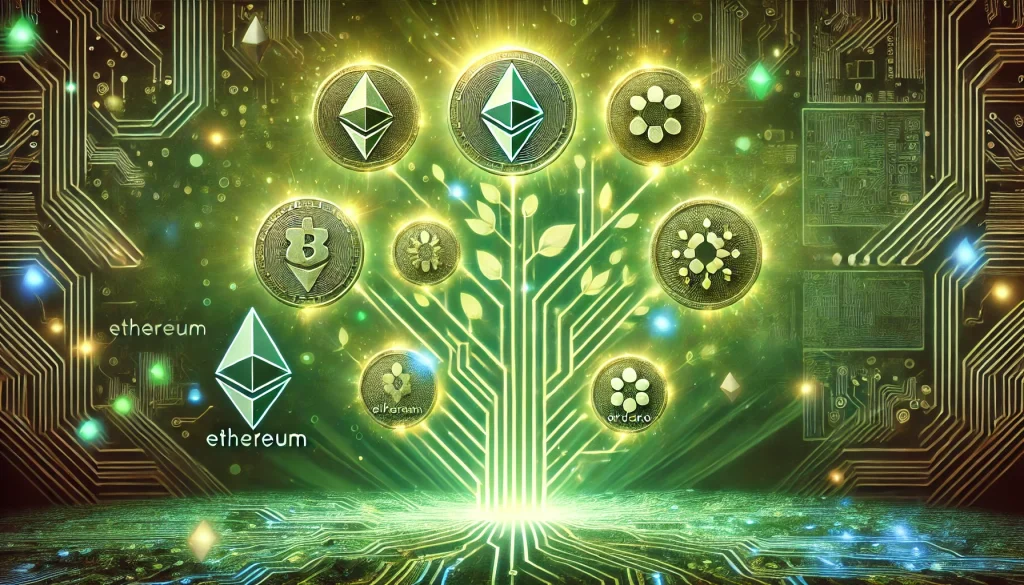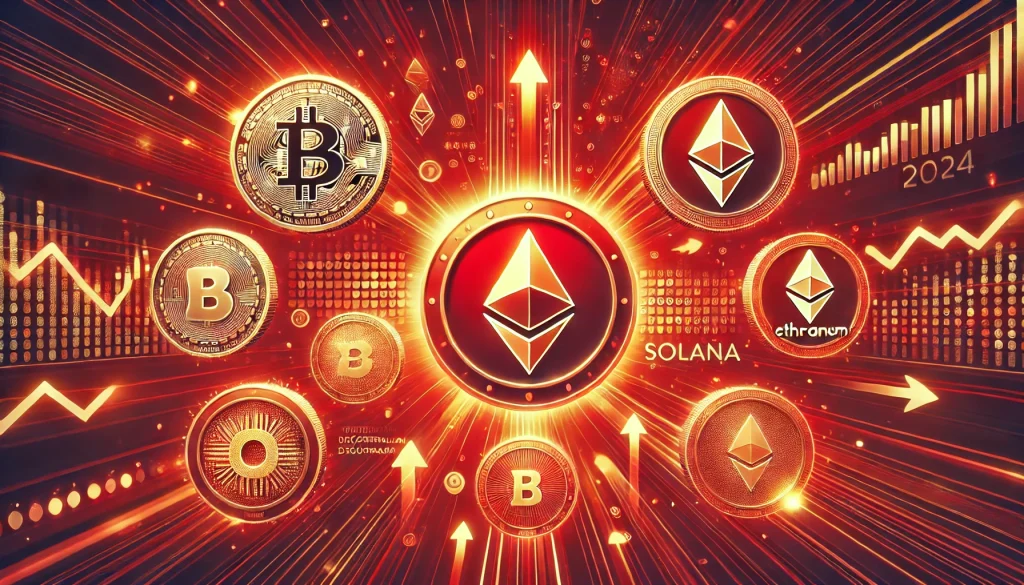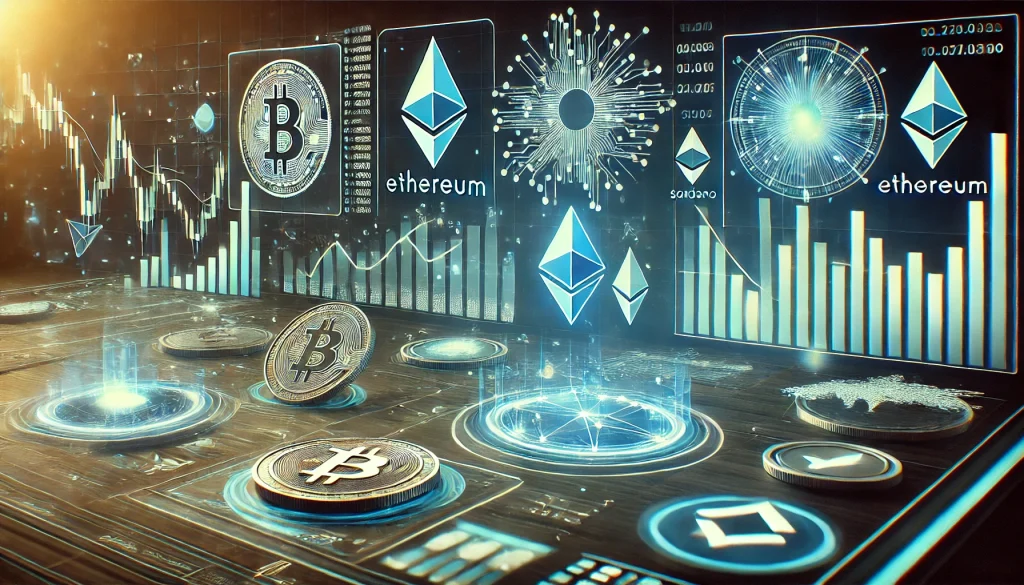Introduction
As the world of cryptocurrency continues to expand, many investors are exploring options beyond Bitcoin, often referred to as altcoins. In this Altcoin Review 2024, we analyze the investment potential of altcoins, some of the most promising alternatives to Bitcoin, and explore their unique characteristics. Whether you’re a seasoned investor or new to crypto, understanding the pros and cons of different altcoins can help you make an informed decision.

Overview
In this altcoin review, we look at the growing cryptocurrency landscape beyond Bitcoin. Altcoins, or alternative coins, offer a wide range of features and functionality, from faster transaction speeds to enhanced privacy and smart contract capabilities. With thousands of options, altcoins cater to a variety of niches and use cases, making them an interesting choice for investors looking to diversify their portfolios. In this review, we take a look at some of the most prominent altcoins, their unique characteristics, and their potential impact on the cryptocurrency market in 2024.
Pros and cons
Pros

- Diverse use cases: Unlike Bitcoin, which is primarily used as a store of value, many altcoins have specific functions. For example, Ethereum is known for its smart contract capabilities, while Ripple facilitates cross-border payments.
- Potential for high returns: Altcoins can offer significant returns, especially if they address a specific market need or back innovative technology.
- Low cost of entry: Some altcoins are cheaper than Bitcoin, making them accessible to a wider range of investors.
- Community support and development: Many altcoins rely on an active community and ongoing development to drive long-term growth.
Cons

- High volatility: Altcoins are often more volatile than Bitcoin, which means their prices can fluctuate significantly, leading to potential losses.
- Low liquidity: Some altcoins have low trading volumes, which can make it difficult to buy or sell quickly at the price you want.
- Regulatory uncertainty: The regulatory environment for altcoins is still evolving, and changes in legislation could cause their value to decline or cause them to be delisted from exchanges.
- Risk of obsolescence: While there are thousands of altcoins on the market, many may not gain popularity and eventually become outdated.
Deep dive analytics

Design
Altcoins are designed with a variety of goals in mind, from enhancing privacy to speeding up transactions. Ethereum, for example, was built as a decentralized platform for smart contracts, allowing developers to build decentralized applications (dApps) on the blockchain. This is fundamentally different from Bitcoin, which was designed primarily as a digital currency. Other altcoins, such as Monero, focus on privacy and offer untraceable transactions, appealing to users concerned about financial anonymity.
Features
Functionality is where altcoins really stand out. Litecoin, for example, was built for faster transaction processing than Bitcoin, with a block time of 2.5 minutes compared to Bitcoin’s 10 minutes. Ripple (XRP) is designed to facilitate fast and cheap international transfers, making it a favorite of financial institutions. Altcoins like Cardano, on the other hand, aim to provide a more energy-efficient proof-of-stake (PoS) consensus mechanism compared to Bitcoin’s energy-intensive proof-of-work (PoW).
Market performance
In terms of market performance, altcoins can be very unpredictable. Some, like Ethereum, have shown steady growth and innovation and remain among the top cryptocurrencies by market capitalization, while others have experienced dramatic price fluctuations, often influenced by market speculation or technological advancements. It’s important to note that while some altcoins have the potential to generate significant returns, they also carry a higher level of risk compared to Bitcoin.
Compare
When comparing altcoins to Bitcoin, several key differences emerge. Bitcoin is still the most widely recognized and adopted cryptocurrency, used as a store of value similar to digital gold. In contrast, altcoins often have more specialized use cases. For example, while Bitcoin’s primary function is as a decentralized digital currency, Ethereum is more versatile as it provides a platform for decentralized applications. Litecoin, another popular altcoin, has fast transaction processing times, which can be advantageous for everyday transactions. However, altcoins have the disadvantage of being more volatile and less widely adopted than Bitcoin.
Compare popular altcoins
| Altcoins | Key use cases | Market capitalization (2024) |
|---|---|---|
| Ethereum | Smart contracts and dApps | 550 billion |
| Litecoin | Quick transactions | 10 billion dollars |
| Ripple (XRP) | Cross-border payments | 30 billion dollars |
Conclusion
In this altcoin review, we’ve explored the diverse and rapidly evolving world of alternative cryptocurrencies. Altcoins offer unique opportunities with special features and the potential for high returns, but they also come with increased risks, including high volatility and regulatory uncertainty. Whether you’re looking to diversify your crypto portfolio or explore new blockchain technologies, altcoins offer a wide range of possibilities. However, it’s important to thoroughly research and understand each altcoin’s use case and market potential before investing. Overall, altcoins can be a useful addition to your investment strategy if you approach them with caution and make informed decisions.
Evaluation
4/5 – Altcoins offer significant opportunity, but also significant risk. They are ideal for investors looking to diversify their crypto portfolio beyond Bitcoin.
FAQ
What is an altcoin?
Altcoins are cryptocurrencies other than Bitcoin that offer different features and use cases that differentiate them from traditional cryptocurrencies.
Will altcoins be a good investment in 2024?
Altcoins can be a good investment if you choose wisely, focusing on altcoins with strong use cases and active development. However, they are more risky compared to Bitcoin.
How are altcoins different from Bitcoin?
Altcoins often offer additional features that are not available with Bitcoin, such as faster transaction times, enhanced privacy, or special features like smart contracts.
See also
- Kelly, A. (2023, July 21). Best altcoins of 2023. Forbes. Retrieved from https://www.forbes.com/advisor/investing/cryptocurrency/best-altcoins/
- Kagan, J. (2023, February 2). Altcoin. Investopedia. https://www.investopedia.com/terms/a/altcoin.asp
- Britannica. (2023). What are altcoins?. https://www.britannica.com/money/what-are-altcoins-tokens
- Koinange, M. (2023, August 25). Altcoins: Definition, history, and examples. Investopedia. https://www.investopedia.com/altcoins-5225935
- Curry, D. (2023, August 3). What are altcoins?. Bankrate. https://www.bankrate.com/investing/what-are-altcoins/
